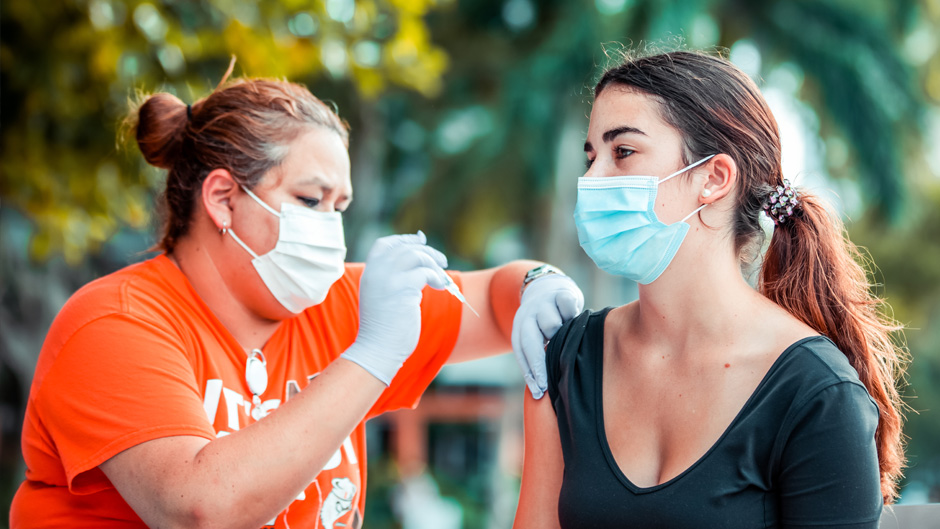A few years ago, Dr. Bhavarth Shukla, medical director of infection control and employee health for the University of Miami Health System, saw the importance of an influenza vaccine illustrated directly. His mother, who does not like needles, decided not to get a flu vaccine, while his father made a point to get the inoculation. Later that winter, his mother got very sick for about two weeks, while his father had the sniffles for a few days.
“Vaccines are great because they prevent severe illness, such as going into a hospital or requiring oxygen to breathe properly,” said Shukla, who is also a physician in the Miller School of Medicine’s Division of Infectious Disease.

With the beginning of flu season here, coupled with the ongoing COVID-19 pandemic, Shukla and Dr. Emilio Volz, who directs the Student Health Service, hope that more Hurricanes and their families will get a flu shot this year. Both said the move, which is required for students, faculty, and staff, will help the University community—and the nation—avoid a rebound of influenza that was muted last year by stringent COVID-19 precautions. On Thursday, the U.S. Centers for Disease Control and Prevention (CDC) also urged U.S. residents to get a flu vaccine to help prevent an undue strain on hospitals if influenza and COVID-19 are circulating this winter.
“Last year we didn’t see much infection, but now with less masking because of the low COVID-19 positivity rates, it’s likely we will have more flu,” Volz said.
According to the physicians, the best way to stay healthy is to get vaccinated against both the flu and COVID-19. That way, people can lower their chances of getting extremely ill from either virus. And the CDC indicates that there is no harm in getting both vaccines together.
“You don’t want to be in a situation where you have both COVID-19 and the flu at the same time, so the more protected people are from the flu, which can be deadly and cause many health issues, the better,” said Volz. “You will also be protecting your neighbors and any vulnerable family members from the dreaded pneumonia that can arise from influenza.”
Why are health care professionals already sounding the alarm about the flu? As COVID-19 numbers start to decline, there’s a good chance other respiratory illnesses may increase this winter, the doctors agreed. In fact, Shukla noted that there has been a recent increase of Respiratory syncytial virus, or RSV, which primarily affects young children, but also impacts the elderly and those who are immunocompromised. RSV can cause bronchiolitis, an inflammation of the small airways in the lungs, or pneumonia.
But influenza is often one of the most dangerous respiratory viruses. Each year, it affects up to 11 percent of the U.S. population, and last winter it took the lives of approximately 20,000 people, according to estimates from the CDC. That was less than the previous two years, which showed 28,000 deaths for 2019, and 52,000 for 2018..
“I have had 30-year-olds and young pregnant mothers who had to be intubated because of the flu after developing pneumonia and it’s such a sad thing to see because it’s completely preventable,” said Volz, who specializes in emergency care and family medicine.
The flu shot is widely available and is updated each year to capture the strains that are predicted to be circulating during the season. Although it is estimated to be between 40 to 70 percent effective at preventing infection (depending on your age and the strain circulating each year), which is less than many of the COVID-19 vaccines, the doctors both heartily recommend it. If nothing else, they pointed out, the vaccine can prevent you from getting severely ill, or from transmitting the illness to those who may suffer worse outcomes from the virus—like children, pregnant women, the elderly, or those who are immunocompromised.

“Flu vaccines have been around a long time, and there’s a good variety of safety data about them,” Shukla said. “They are definitely worth taking for your own safety and for the health of those around you.”
Besides Shukla’s own experience, scientific data supports the idea that flu shots lessen the severity of the virus if a person who gets the vaccine catches the flu. According to a study done from 2012 to 2015, people who received a flu shot had a 60 percent reduction in the odds of being admitted to a hospital’s intensive care unit if they got the flu compared with those who did not get a flu shot, Shukla reported.
In addition, a recent study from a team of Miller School researchers demonstrated that getting a flu shot may also help reduce the severity of COVID-19, should a person test positive for the novel coronavirus.
There are a few different ways to get protection from the flu. While most people get an injection, there is a nasal spray for those who are not pregnant or immunocompromised. This version is not offered on campus, but some pharmacies carry it. In addition, for those older than 65 (who are most vulnerable to the flu), it is recommended that they get a higher dose of the vaccine. And for people with egg allergies, there is a different version of the vaccine that does not contain any egg protein. All flu vaccines this year are considered quadrivalent, which means they protect against four different varieties of the flu.
As far as side effects, there are very few documented from the flu shot—other than some pain around the injection site and sometimes a temporary headache, Shukla noted. Although some people often complain about respiratory symptoms, there is no live flu virus in the vaccine, so it may just be that these people are getting a cold, he added.
Typically, Florida has two peak periods for influenza—in December and then in late February or early March, Shukla pointed out. But last year, surges in COVID-19 replaced these annual increases. Therefore, it is still unclear what may occur this winter.
“Now that businesses are relaxing the masking requirements and people are starting to travel more and gather in groups, those things will accelerate any respiratory viruses from spreading,” Shukla said. “It’s just a question of which ones we will be dealing with, but certainly it could be the flu.”
To get your flu shot on the Coral Gables Campus, students can visit the tent outside the Lennar Foundation Medical Center anytime on Monday through Friday between 9 a.m. and 4 p.m. or they can schedule an appointment with Student Health Service. Coral Gables employees can schedule an appointment with the Healthy Canes Employee Clinic in the McKnight Building. Students and employees on the Medical Campus can visit the Employee Health Office at Dominion Tower, Suite 405, or the UMH Tower Clinic on the fifth floor of the west building. In addition, a pop-up tent for flu vaccinations will be at the Rock Plaza for students on Monday, Oct. 18, from 11 a.m. to 2 p.m. and on Tuesday, Oct. 19,, also at the same time, at Westbrook Walkway, next to the Shalala Student Center. Get more information about campus flu shot locations.

